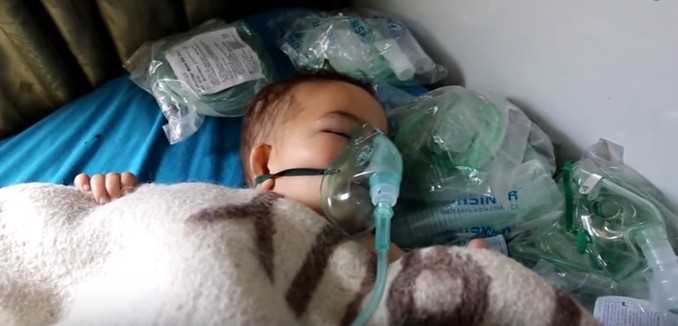Iran’s support of the Syrian regime in the wake of a gas attack against civilians in northern Syria raises questions about its own chemical weapons program, a research fellow at the Foundation for Foundation of Democracies wrote Wednesday in the New York Daily News.
Iran has enabled Syrian President Bashar al-Assad’s “chemical and barrel bombing war against his population,” Benamin Weinthal observed, despite Iranian Foreign Minister Mohammad Javad Zarif’s assertion that Iran would never tolerate the use of weapons of mass destruction since its soldiers were subjected to chemical attacks by the late Iraqi dictator Saddam Hussein.
Zarif’s deflection aside, there is mounting evidence that Iran has an active chemical weapons program, Weinthal pointed out.
An annual report published by Germany’s intelligence agencies last year found that in 2015, Iran sought components in at least half of Germany’s states that could be “implemented for atomic, biological and chemical weapons in a war.”
Similarly, as the Congressional Research Service (CRS) noted late last year, “U.S. reports indicate that Iran has the capability to produce chemical warfare (CW) agents and ‘probably’ has the capability to produce some biological warfare agents for offensive purposes, if it made the decision to do so.”
“This raises questions about Iran’s compliance with its obligations under the Chemical Weapons Convention (CWC), which Iran signed on January 13, 1993, and ratified on June 8, 1997,” the CRS report added.
The East Kurdistan Defense Forces (YRK), which clash with Iranian government forces in the country’s Kurdish-dominated areas, claimed last October that Iran may have used chemical weapons against 12 of its fighters, the Kurdish news site Rudaw reported. The YRK is the armed wing of the Free Life Party of Kurdistan, a group branded as a terrorist organization by the United States.
“Iran’s efforts to play the victim in 2017 about chemical warfare does not mesh with its track record of supporting Assad in his scorched earth chemical warfare against Syrian civilians,” Weinthal noted. “[One] of the keys to ousting the Assad regime is to evict Iran and its strategic partner Hezbollah from Syria.” Punishing Iran and Assad “on the chemical and biological weapons front” would be a good start to “help keep Syria free of chemical weapons and a safer place for civilians,” he concluded.
[Photo: BBC News / YouTube ]




